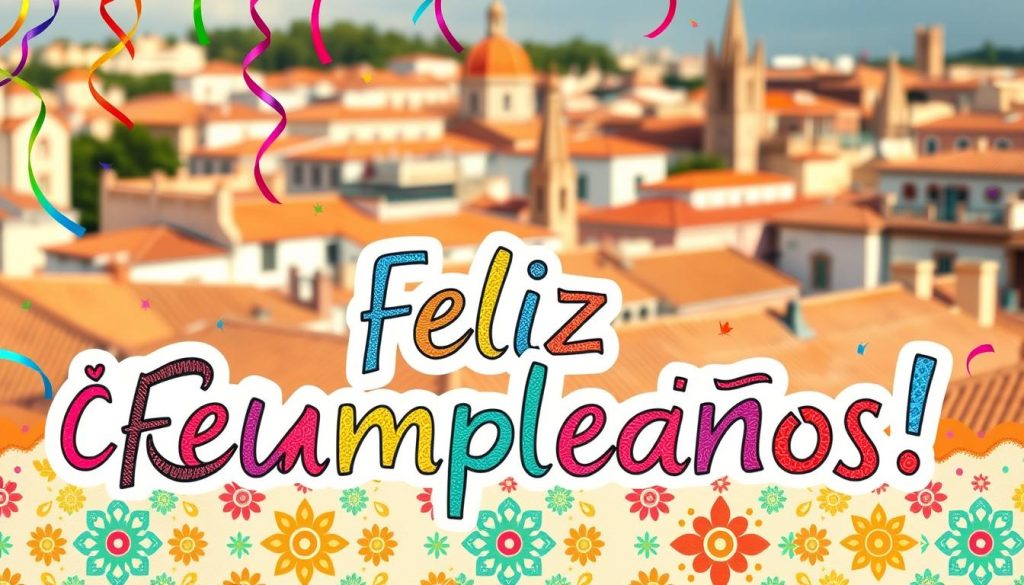Spanish birthday greetings create powerful cultural connections. They help you celebrate with Spanish-speaking friends and family. Mastering these expressions enhances your language skills and relationships.
“Feliz cumpleaños” is the most common way to say happy birthday in Spanish. It’s widely recognized across Spanish-speaking regions. Young people often use “Feliz cumple,” a friendly, shortened version.
Spanish birthday wishes offer various ways to show warmth. You can add phrases like “¡Te deseo lo mejor!” (I wish you the best!). Another option is “¡Que cumplas muchos más!” (Hope you have many more birthdays!).
These expressions add a personal touch to your greeting. They make your birthday wishes more meaningful and heartfelt1.
Key Takeaways
- “Feliz cumpleaños” is the standard Spanish birthday greeting
- Young people often use the shortened “Feliz cumple”
- Additional phrases can make birthday wishes more personal
- Understanding cultural context enhances communication
- Practice helps improve Spanish birthday vocabulary
Common Ways to Say Happy Birthday in Spanish
Spanish birthday greetings showcase rich linguistic traditions. They offer a window into Spanish-speaking cultures. Mastering these wishes can boost your multilingual skills.
Birthday celebrations abroad provide language immersion opportunities. They also foster cross-cultural understanding. These greetings can enhance connections with Spanish-speaking friends.
Basic Birthday Expressions
Spanish offers over sixty unique birthday congratulations2. Here are some popular greetings:
- ¡Feliz cumpleaños! – The most classic birthday wish
- ¡Feliz cumple! – A casual, shortened version
- ¡Muchas felicidades! – Meaning “Many congratulations!”
Pronunciation Guide
Proper pronunciation is crucial for confident communication. Here’s a quick guide to saying these birthday wishes:
| Phrase | Pronunciation | Meaning |
|---|---|---|
| ¡Feliz cumpleaños! | feh-lees coom-pleh-ah-nyos | Happy Birthday! |
| ¡Feliz cumple! | feh-lees coom-pleh | Happy Birthday! (Casual) |
Formal vs Informal Wishes
Your relationship with the birthday person determines the greeting. Use Estimado for formal settings and Querido for casual ones2.
Playful wishes can include humorous phrases. For example, “Congratulations on getting slightly older!”2
Pro tip: Spanish-speaking cultures celebrate birthdays by sharing joy and connecting3.
Cultural nuances add depth to birthday wishes. In Spain, people tug the birthday person’s ear for each year.
They add one extra tug for luck3. These details make language learning a cross-cultural adventure.
Traditional Birthday Songs and Celebrations in Spanish-Speaking Countries
Birthday traditions in Spanish-speaking countries burst with festive spirit. These customs offer a fun way to dive into Spanish culture. Discovering unique birthday rituals adds excitement to learning the language.
Mexico’s “Las Mañanitas” is a beloved birthday song. It’s not just for birthdays, though. People sing it on All Saints’ Day and Mother’s Day too4. The song often starts early in the morning, making birthdays extra special4.
- Most Mexican parties sing only the first two verses of “Las Mañanitas”4
- Mariachi bands sometimes perform the song formally4
- Piñatas have become a staple at children’s birthday parties4
Each Spanish-speaking country has its own birthday song. Spain uses “Cumpleaños feliz”. Argentina sings “Que los cumplas feliz”. Colombia’s version goes “Cumpleaños feliz te deseamos a ti”5.
These songs show how rich language immersion can be. Birthday parties often include piñatas, surprises, and fun games. “¡Feliz cumpleaños!” is the most common birthday greeting everywhere5.
The word “cumpleaños” means “to turn years”. It beautifully captures how Spanish celebrates aging5.
Conclusion
Spanish birthday wishes open doors to rich cultural connections. They go beyond words, linking you to vibrant traditions across Spanish-speaking communities6. Learning these expressions turns language study into an exciting cultural adventure7.
Each greeting, from “¡Feliz cumpleaños!” to local customs, holds deep meaning8. Unique traditions like ear-pulling in Argentina or piñata-breaking in Mexico showcase joyous cultural spirits7.
Using these phrases boosts your Spanish skills and builds genuine connections. It shows respect and interest in Spanish-speaking heritage6. Your efforts bridge cultures and foster understanding.
Multilingual communication creates cultural bridges. Start using these birthday wishes today. Watch your language skills and cultural awareness grow!
FAQ
What is the most common way to say “Happy Birthday” in Spanish?
How do I pronounce “Feliz Cumpleaños”?
Are there different ways to say “Happy Birthday” depending on the relationship?
Do Spanish-speaking countries have unique birthday traditions?
How can I make my birthday wishes more personal in Spanish?
Is there a traditional birthday song in Spanish?
What are some alternative birthday wishes in Spanish?
Source Links
- ¡Feliz cumpleaños! How to Say Happy Birthday in Spanish – https://baselang.com/blog/vocabulary/happy-birthday-in-spanish/
- How to Say Happy Birthday in Spanish in 60 Fun & Unique Ways – https://www.berlitz.com/blog/happy-birthday-spanish-song
- How to say “Happy Birthday” in Spanish: The ultimate guide – https://preply.com/en/blog/happy-birthday-in-spanish/
- How to Sing Happy Birthday in Mexico – https://www.thoughtco.com/what-is-las-mananitas-1588859
- How to sing Happy Birthday in Spanish – https://www.bergesinstitutespanish.com/blog/how-to-sing-happy-birthday-in-spanish
- 65 Unique Birthday Wishes in Spanish – Paige Simple – https://www.paigesimple.org/happy-birthday-in-spanish/
- Happy birthday in Spanish: Relevant song phrases and more – Learn languages with italki – https://www.italki.com/en/blog/happy-birthday-in-spanish
- How to Say Happy Birthday in Spanish – GeeksforGeeks – https://www.geeksforgeeks.org/happy-birthday-in-spanish/
